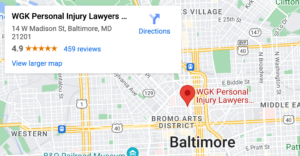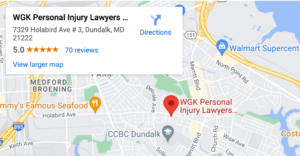
When you are injured in a car accident, you may be left out of work, struggling to perform basic tasks, and with a painful recovery ahead of you. When someone else’s negligence caused your accident, the last thing you should be worried about is fighting the insurance company for fair compensation.
Unfortunately, that is a battle many accident victims face.
After you submit an insurance claim to the at-fault party’s insurance carrier, you will likely receive an initial settlement offer – sometimes in a matter of days. As much as you need the compensation now, it’s rarely a good idea to accept the first offer from the insurance company.
Here’s what you should keep in mind when considering insurance settlements and how an injury lawyer can help.
Table of Contents
Why You Might Not Want to Accept That First Offer to Settle

In most cases, you should not accept the first settlement offer you receive. The compensation you get through a settlement will be all you can recover for the accident.
This money must cover not only medical expenses and vehicle repairs but your lost wages and long-term costs. If your injury is very serious, you may be facing a permanent disability that impacts your ability to work.
Here are the most important factors you should consider when assessing a settlement offer and why the first offer is unlikely to fully compensate you.
Your Injuries May Be More Serious Than You Think
Do not assume you know the full extent of your injuries until you’ve received the medical attention you need and enough time has passed. It’s a common mistake made by accident victims: injuries seem minor at first, or they have been treated. When the insurance company is quick to make a settlement, you may jump at the offer without realizing the severity of your injuries.
There are many reasons the full extent of your injuries may not be apparent for weeks or even months. Your wounds may not heal as they should, more extensive treatment may be needed, there may be complications, or the injuries might not have side effects at first.
Traumatic brain injuries, for example, may cause cognitive problems that aren’t apparent at first and may last a long time.
Before you accept a settlement offer, you must know the severity of your injuries and how they will affect you now and in the future in terms of:
- Overall health
- Activity levels
- Mobility
- Employment
- Quality of life
Your personal injury lawyer will likely advise you to wait until you reach maximum medical improvement (MMI) before settling your insurance claim. This happens when your doctor determines that no additional treatments will improve your condition.
Your Damages Are Higher than Your Out-of-Pocket Expenses
The initial offer you receive from the insurance company will likely only cover property damage and basic medical expenses you have incurred so far. For example, after auto accidents, insurance companies may try to settle for the property damage to your vehicle, an ER bill, and an ambulance ride, regardless of how seriously you were hurt.
While the insurance company will only want to offer obvious out-of-pocket expenses you have incurred, your accident likely resulted in many damages that are not so obvious and may not be for some time.
A fair settlement offer will include full compensation for your injuries and damages such as:
- Vehicle repairs and alternate transportation
- Lost wages
- Expected lost earning capacity or disability
- Medical bills such as surgery, doctor visits, hospitalization, medical devices, prescriptions, and physical therapy
- Home care or household services for help while you recover
- Counseling
- Pain and suffering
- Emotional distress
- Loss of enjoyment of life
Only when you understand the value of everything you lost in the accident can you assess whether a settlement offer is actually fair.
The Initial Offer Is Usually Low
The first offer you receive from the insurance company will usually be quite low. In fact, it may not even compensate you for your immediate damages, let alone future damages you will face. This first offer is made so the insurance adjuster can see what you will do next.
The insurance company hopes you will accept the initial offer because that will bring your claim to an end. Remember: the insurance company’s goal is to pay out as little as possible. They know you need the compensation for lost wages, vehicle damage, and medical expenses and hope you are desperate enough to take a low offer.
A Settlement Agreement Is Final and Binding
Finally, once you accept a settlement offer and sign the agreement, it will become legally binding. Settlement agreements always include a release of liability that means the insurance company is not liable for any additional payments.
After signing the settlement, you cannot receive additional compensation, even if you later discover your injuries are worse than you thought or you suffer additional damages due to complications. The settlement amount will be final. This is a major danger if you agree to a settlement offer too quickly!
When You Should Accept the Insurance Offer
Most personal injury cases end with a settlement, not a jury award. While you rarely want to accept the first offer from the insurance carrier, you will likely reach a point at which the offer becomes fair.
As a general rule, you should not accept a settlement offer until:
- You are fully recovered from your injuries or have reached maximum medical improvement
- Your non-economic damages have been fully considered
- Your personal injury lawyer has helped you understand the full value of your claim
Once these factors have been met, you will be in a better position to decide when a settlement is fair and fully compensates you.
Contact a Personal Injury Lawyer for Help Dealing with Insurance
The insurance company’s offer is not final; it’s an opportunity to negotiate to seek fair compensation that considers all of the damages you suffered. A personal injury attorney can help you deal with the insurance company, negotiate on your behalf, and demonstrate that you are not simply going to accept a lowball offer and go away.
If you have been injured in an accident, contact our Baltimore office to schedule a free consultation, you can give us a call at (410) 837-2144 to speak with an experienced Maryland personal injury lawyer at WGK Personal Injury Lawyers Our law firm has more than 80 years of combined experience representing injury victims and fighting large insurance companies. We will give you the sound legal advice you need to navigate the claims process and ensure the settlement offer you receive is reasonable.


